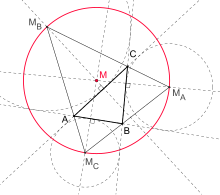Bevan point


In geometry, the Bevan point, named after Benjamin Bevan, is a triangle center. It is defined as center of the Bevan circle, that is the circle through the centers of the three excircles of a triangle.[1]
The Bevan point of a triangle is the reflection of the incenter across the circumcenter of the triangle.[1] Bevan posed the problem of proving this in 1804, in a mathematical problem column in The Mathematical Repository.[1][2] The problem was solved in 1806 by John Butterworth.[2]
The Bevan point M of triangle △ABC has the same distance from its Euler line e as its incenter I. Their distance is where R denotes the radius of the circumcircle and a, b, c the sides of △ABC.[2]
The Bevan is point is also the midpoint of the line segment NL connecting the Nagel point N and the de Longchamps point L.[1] The radius of the Bevan circle is 2R, that is twice the radius of the circumcircle.[3]
References
[edit]- ^ a b c d Encyclopedia of Triangle Centers. X(40) = BEVAN POINT
- ^ a b c Weisstein, Eric W. "Bevan Point". MathWorld.
- ^ Alexander Bogomolny. Bevan's Point and Theorem at cut-the-knot

